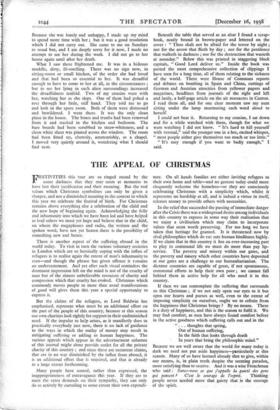THE APPEAL OF CHRISTMAS
There is another aspect of the suffering abroad in the world today. To visit in turn the various voluntary societies in London which are so heroically coping with the influx of refugees is to realise again the extent of man's inhumanity to man—and though the phrase has given offence it remains an understatement. And yet after such visual reminders the dominant impression left on the mind is not of the cruelty of man but of the almost unbelievable resources of charity and compassion which that cruelty has evoked. Christmas which commonly moves people to more than usual manifestations of good will gives them this year a special opportunity to express it.
But the claims of the refugees, as Lord Baldwin has emphasised, represent what must be an additional effort on the part of the people of this country, because at this season our own charities look rightly for support in their undiminished need. If the impulse to help arises, as it manifestly does in practically everybody just now, there is no lack of guidance to the ways in which the outlay of money may result in mitigating suffering or adding to human happiness. The various appeals which appear in the advertisement columns of this journal might alone provide outlet for all the private charity of this country ; and since these are recurrent claims) that are in no way diminished by the influx from abroad, it is an additional effort that is required, and that is already to a large extent forthcoming.
Many people have sensed, rather than expressed, the inappropriateness of extravagance this year. • If they are to meet the extra demands on their sympathy, they can only do so actively by curtailing to some extent their own expendi- ture. On all hands families are either inviting refugees to their own home and table—and no gesture today could more eloquently welcome the homeless—or they are consciously celebrating Christmas with a simplicity which, whilst it represents no hardship at all, and is indeed a virtue in itself, releases money to provide others with necessities.
In the relief that succeeded the passing of immediate danger after the Crisis there was a widespread desire among individuals in this country to express in some way their realisation that we enjoy a civilisation which may claim to incorporate values that seem worth preserving. For too long we have taken that heritage for granted. It is threatened now by rival philosophies which do not rate human kindliness highly. If we claim that in this country it has an ever-increasing part to play in communal life we must do more than pay lip- service. The poverty and misery within our gates, and the poverty and misery which other countries have deposited at our gates are a challenge to our humanitarianism. The dictator countries are capable of great, if not spontaneous, communal efforts to help their own poor ; we cannot fall behind them in active help for all who need it in this country.
If then we can contemplate the suffering that surrounds us this Christmas ; if we not only open our eyes to it but open our hearts and purses as well, even to the extent of imposing simplicity on ourselves, ought we to refrain from the happiness that Christmas brings ? By no means. There is a duty of happiness, and this is the season to fulfil it. We may find comfort, as men have always found comfort before in the active goodness which suffering calls out and in the " . . . thoughts that spring, Out of human suffering, In the faith that looks through death • In years that bring the philosophic mind."
Because we are well aware that the world for many today is dark we need not put aside happiness—particularly at this season. Many of us have learned already that to give, within our means, is, in plain truth despite the seeming paradox) more satisfying than to receive. And it was a wise Frenchman who said : Savez-vous ce que j'appelle la gaiete des gens qui pensent ? .cest je courage de, Pesprit. Thinking people never needed more that gaiety that is the courage of the spirit. .














































 Previous page
Previous page